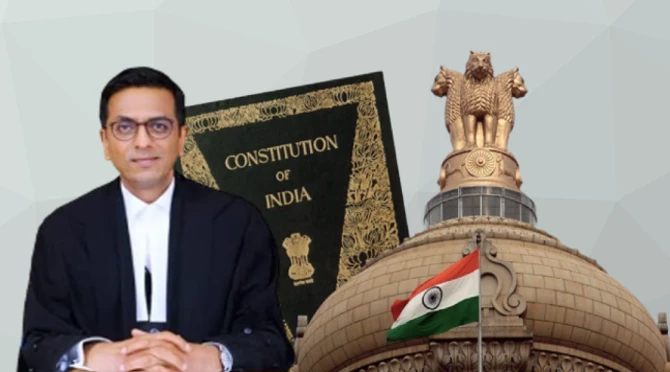
Chief Justice of India D.Y. Chandrachud emphasized the Constitution as a “powerful tool” for addressing disparities, creating institutions and structures designed to guard against inequality.
Speaking at the 13th convocation ceremony and founder’s day of O.P. Jindal Global University, the CJI urged students to identify and address injustice in all its forms.
“The Constitution is a powerful tool to curb such disparities. It establishes institutions and structures that are meant to guard against both apparent and invisible inequalities,” he said. “It performs a horizontal function by regulating inter-institutional relationships and a vertical function by managing the relationship between the State and the people. Beyond this, the Constitution ingrains these values into our social fabric.”
The CJI noted that constitutional theorists attribute the stability of democracies to the enduring principles of their constitutions.
“We often take for granted the stability our Constitution provides to our civic lives. Its longevity reflects the foresight of our framers, who designed it to incorporate essential elements without making it rigid and brittle,” he said.
The CJI praised the Constitution for being both a solid foundation for democracy and sufficiently flexible. “While we recognize inequality as unjust, our understanding of equality may vary. Does similar treatment always promote equality, or can it sometimes exacerbate disparities? Does the law address only manifest inequality or also inequality hidden under protective discrimination and non-interference?” he questioned.
For example, the law prohibits discrimination based on sex. However, a law restricting women from working in certain establishments for security reasons might seem beneficial but could actually perpetuate gender stereotypes. “Such a law would not withstand constitutional scrutiny because it reinforces stereotypical assumptions and entrenched gender roles,” Justice Chandrachud explained.
He highlighted that justice manifests differently in various contexts and requires a compassionate perspective to identify injustices. “We live amidst complex inequalities, and there are no straightforward legal solutions. The answers lie in nuanced, compassionate, and professional approaches, which you are now equipped to develop,” he said.
Addressing issues like climate change, information gaps, and uneven resource distribution, the CJI emphasized that solutions are not confined to any single professional domain.
“Finding the best solutions requires exploration and cooperation. We must not be guided solely by expediency, rationality, and pragmatism but also incorporate accessibility, inclusivity, and diversity into our decisions,” he stated.
The Chief Justice of India acknowledged that our social order is not flawless, and existing problems can exacerbate underlying imperfections, thereby entrenching pre-existing inequalities.
He urged the students to act not only as ambassadors of their alma mater but also as voices of reason amidst societal noise.
“The challenge today is the clutter of noise, and we need reasoned voices among unchecked passions,” he said. “From my experience as a judge, a voice of reason and sincerity stands out clearly. You must embody the spirit of the Constitution in all your endeavors.”
The CJI encouraged the students to view themselves as stakeholders in society’s diversity and well-being. “Even as Supreme Court judges, we continually learn, unlearn, and relearn different approaches to the law and its interpretations,” he concluded.




